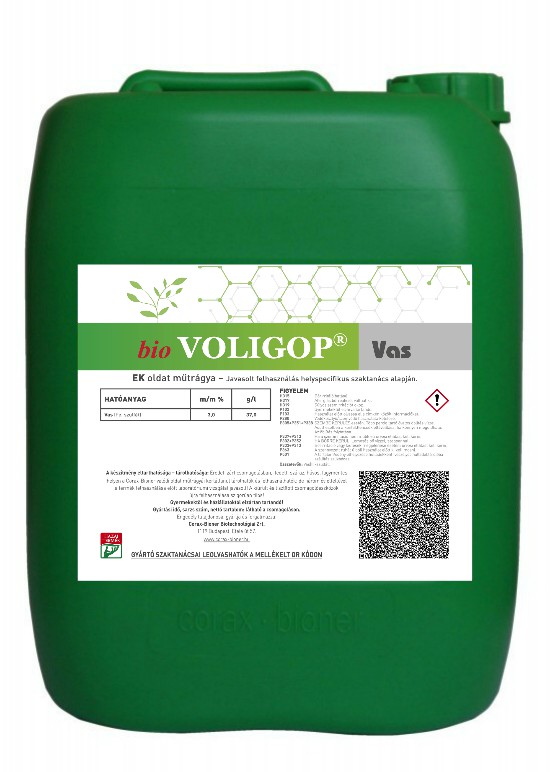
Application field: Bio Foliar Fertilizer
Active Substance: Macro-, mezo-, and micro-elements according to the EC Regulation No 2003/2003.
Sodium and chlorine free premium EC fertiliser
Iron is the component of several enzymes and plays an important role in chlorophyll synthesis; significant iron deficiency usually develops in soils with a high pH-value. The deficiency of iron causes so-called iron-chlorosis, the typical symptom of the tips turning yellow, which starts on the youngest leaves; the inter-vein areas turn yellow and the veins remain green. In the absence of iron the production of chlorophyll is reduced! In more severe cases the leaves turn completely white and on the edges of the leaves brown, irregular necrotic spots appear. The leaves suffering from iron deficiency usually do not fall during the growing season.
In general iron is available in the soil, but in a form that it is hard to absorb. Iron deficiency often develops due to the absorption-related difficulties. In the life of plants the symptom of lime-chlorosis is well-known, when due to the high calcium-carbonate content present in the soil, the resulting higher pH value inhibits the absorption of iron, and/or the iron in the plant is unable to participate at the bio-synthesis of chlorophyll. The inter-vein areas of the young leaves become lighter, while the veins remain green. In the case of monocotyledons longitudinal stripes are detected. In the case of significant deficiency the leaves turn completely white and the veins of the leaves do not differentiate from the colour of the other parts of the leaf-blade. High levels of phosphorus fertilisation might also trigger the symptoms of iron deficiency, which may further increase in the case of calcareous soils and soils with high clay content. Overdosage of nitrogen, zinc and calcium may prevent the absorption of iron from the soil.
In the case of severe iron deficiency the development of fruit trees is delayed, fruits become small and extremely coloured. Fruit bearing plants require iron the most (in the highest quantity) from the micro-elements. Fruit species most sensitive to the deficiency of iron include apple, pear, and quince, cherry, peach, plum, strawberry, raspberry and all leafy ornamental plants. As a result of iron deficiency the development of fruit trees stops, the fruits become small, hard and with a hard pulp (also in the case of Citrus-species), in the case of peach the frost-resistance of the fruit deteriorates.
As a result of iron deficiency, in the case of grape reduced shoot development, leaf and shoot necrosis, berry kick-off may develop, which may result in significant crop loss.
Copyright © 2017 Corax Bioner Co. | All rights reserved | Data protection